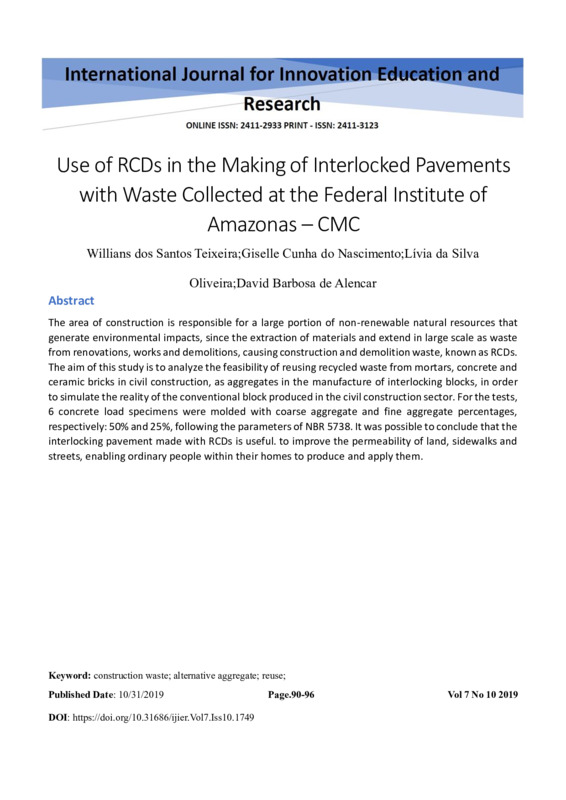Use of RCDs in the Making of Interlocked Pavements with Waste Collected at the Federal Institute of Amazonas – CMC
Item
-
Tipo do ITEM
-
Artigo Ciêntifico
-
Título do Artigo
-
Use of RCDs in the Making of Interlocked Pavements with Waste Collected at the Federal Institute of Amazonas – CMC
-
Descrição
-
Abstract
The area of construction is responsible for a large portion of non-renewable natural resources that
generate environmental impacts, since the extraction of materials and extend in large scale as waste
from renovations, works and demolitions, causing construction and demolition waste, known as RCDs.
The aim of this study is to analyze the feasibility of reusing recycled waste from mortars, concrete and
ceramic bricks in civil construction, as aggregates in the manufacture of interlocking blocks, in order
to simulate the reality of the conventional block produced in the civil construction sector. For the tests,
6 concrete load specimens were molded with coarse aggregate and fine aggregate percentages,
respectively: 50% and 25%, following the parameters of NBR 5738. It was possible to conclude that the
interlocking pavement made with RCDs is useful. to improve the permeability of land, sidewalks and
streets, enabling ordinary people within their homes to produce and apply them.
Keyword: construction waste; alternative aggregate; reuse;
-
Abstract
-
Abstract
The area of construction is responsible for a large portion of non-renewable natural resources that
generate environmental impacts, since the extraction of materials and extend in large scale as waste
from renovations, works and demolitions, causing construction and demolition waste, known as RCDs.
The aim of this study is to analyze the feasibility of reusing recycled waste from mortars, concrete and
ceramic bricks in civil construction, as aggregates in the manufacture of interlocking blocks, in order
to simulate the reality of the conventional block produced in the civil construction sector. For the tests,
6 concrete load specimens were molded with coarse aggregate and fine aggregate percentages,
respectively: 50% and 25%, following the parameters of NBR 5738. It was possible to conclude that the
interlocking pavement made with RCDs is useful. to improve the permeability of land, sidewalks and
streets, enabling ordinary people within their homes to produce and apply them.
Keyword: construction waste; alternative aggregate; reuse;
-
Língua do arquivo
-
inglês
-
Data da Publicação
-
Ano 2019
-
Palavra-chave
-
construction waste
-
alternative aggregate
-
reuse
-
Autores
-
Willians dos Santos Teixeira
-
Giselle Cunha do Nascimento
-
Lívia da Silva Oliveira
-
David Barbosa de Alencar
-
Local
-
ITEGAM - Manaus, 2019


